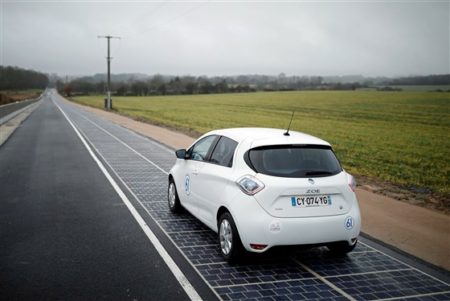August 18, 2019 – Back in 2014 I posted a blog that featured a company called Solar Roadways. They had launched an Indiegogo crowdfunding campaign to raise money to cover road and sidewalks with solar road panels. The company’s product launch was accompanied by significant press and enthusiasm from the public as they raised $2.2 million through their crowdfunding efforts. Even the U.S. government and Google got interested. But when I went to visit their website recently, nothing had been updated since 2016.
I had some serious concerns about laying down photovoltaics on a road surface largely because of wear and tear. Solar Roadways claimed their solar road panels could withstand weights of up to 113,000 kilograms (250,000 pounds) which would certainly handle the largest semi-trailer rigs or even an Abrams battle tank.
Solar Roadways weren’t alone in proposing paving roads, parking lots, and sidewalks with solar panels. A French company, Colas, developed Wattway, resin-reinforced solar-panel sheets that were installed in a first test road covering one kilometer (0.6 miles) near the city of Caen, in Normandy. At the time the French government touted the technology as being “unprecedented,” and that this small stretch of road would generate enough electricity to power the streetlights of a neighbouring town of 3,400 residents. The ultimate goal, the government stated, was to pave 1,000 kilometers (621 miles) of road with Cola’s panels over five years.
This is what this $5.2 million USD road looked like shortly after installation.

This is what parts of the roadway looked like (see image below) by May 2018 when 90 meters (300 feet) of it was beyond repair and had to be demolished.

It turned out that Thunderstorms, local farm tractors, and other traffic caused photovoltaic panels to break (see picture below).
And then there were falling leaves and debris that reduced the amount of power the panels could generate. The solar road at best produced 80,000 kilowatt-hours (Kwh) annually although the trial target was almost twice that. And by July of this year, the yield annual average had dropped to 40,000 Kwh. With such declining results it was time to pull the plug.
When I wrote about Solar Roadways back in 2014 I wondered about the durability of creating roadways paved with solar panels. I thought about winter snowfalls, freezes, and thaws, about oil spills, garbage on the road, falling leaves, roadkill, and more, and wondered how a technology like this could endure.
It appears as of right now, that the pioneers trying to make this technology work have discovered that “unprecedented” and being named the Google Moonshot of May 2013, doesn’t necessarily mean you will succeed.
Why not put elevated solar panels on the sides of roadways instead considering you have clearance and rights of way that could facilitate this type of implementation. Or you can try to use the power engendered by wheels running over pavement through the installation of piezoelectric power generators. The latter continues to be a technology of interest to university engineering labs and the like. But it appears little progress has been made to turn this technology into a commercial and operational success. The only reference to an installed site that I could find is a 10-meter (33 foot) strip of asphalt along Route 4, an old coast road in Israel where it generated in a test 2,000 watt-hours of electricity.
It appears we have a long way to go before our roads become sources of energy whether solar or piezoelectric, rather than locales where massive amounts of energy get burned daily contributing to global warming.









I like the valuable info you provide in your articles. I will bookmark your blog
and check again here frequently. I am quite sure I’ll learn lots of new stuff right
here! Best of luck for the next!
I think solar-powered roads are an innovative idea, but their feasibility is still uncertain.